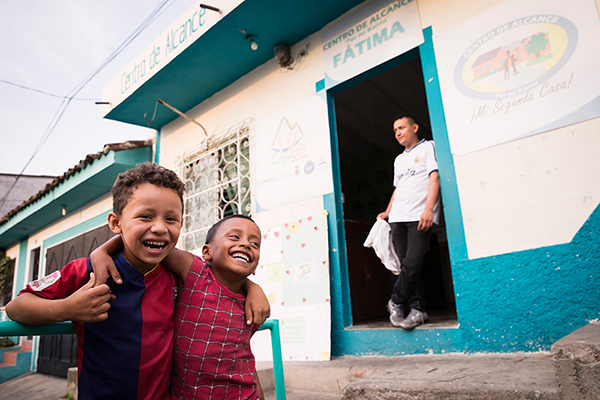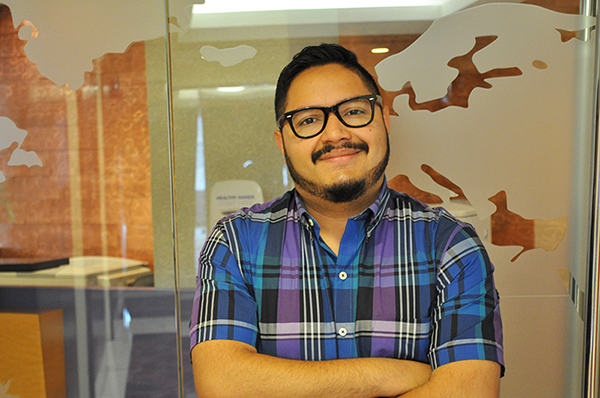
I lived in El Salvador all my life until coming to the U.S. to study in 2014. I grew up hearing “old” stories from the civil war as told by my parents, uncles and teachers. The armed conflict seemed so long ago. I was five years old when the peace agreements were signed in Chapultepec, Mexico in 1992.
What I didn’t know as a child was that as I was growing up in a loving household with both of my parents, many young Salvadorans were growing up as children of the war—a generation of parentless households in forgotten communities. And as I dreamt of being a lawyer after graduating high school, it did not matter much what their dreams were, because gangs had different plans for them.
My reality was relatively disconnected from the forgotten communities plagued by gang activity. Following a period of high crime rates, my home town of Santa Tecla saw a dramatic decline in violence and criminality during the first years of the 21st century. This unfortunately was not the case for other cities across my country.
A dangerous line of thinking
Now, it is impossible to turn on the television or radio or get on the Internet without coming across headlines describing the rampant violence affecting El Salvador. I have developed a disturbing habit when I read the news. Despite how depressed it makes me, I can’t stop myself from reading the comments section of news articles about gang violence in El Salvador.
The same malevolent thoughts are expressed over and over again:
“Kill them all…”
“Just toss them all in prison and set everything on fire…”
“Mareros [gang members] are not human beings, they should not be treated as such…”
Why do I do it? I do it because I’m constantly looking for that one comment of hope, which calls for sanity and compassion, instead of a new wave of “escuadrones de la muerte”—or death squads—and blood.
As reporter Daniel Alarcón puts it, “The very fact that a proposed genocide [against gang members] has to be discussed in terms of its practicality, and not its immorality, tells you a great deal about the gravity of the situation in El Salvador.”
Alarcón is a reporter for The New Yorker, who recently visited El Salvador to follow up an investigation by online news outlet El Faro regarding a massacre perpetrated by the National Civil Police at a small farm in San José Villanueva, in which police killed eight people on March 26, 2015, claiming that all of them were gang members who had initiated the shooting.
During his time in El Salvador, Alarcón encountered the same thoughts when interviewing people in the streets as I do in the comments section of the many articles I read and from endless conversations with my friends and acquaintances.
Alarcón interviewed one girl who claimed that despite her best efforts to stay away from gangs, they found ways to invade her life through harassment, extortion and more. In her frustration, he reports, she also thinks that it’s best to annihilate gangs.
While Alarcón heard multiple stories like this girl’s and understands where the anger is coming from, he suggests there might be a better solution through policy.
“It’s easy to empathize with that anger,” he says. “I heard her stories and others like them, and I confess that I began to feel it, too. But can you create policy from rage?”
For the case of San José Villanueva, the police claim that they acted legitimately in defense after gang members who were hiding in the farm opened fire. However, the operation also took the life of an innocent “escribiente,” a farm worker, who, according to his mother, begged the police to spare him his life.
Moving beyond more violence
Because El Faro covered the details of the police killing of the gang members at San José Villanueva, the paper has faced a big backlash from people claiming the news outlet is promoting the gang members, instead of focusing on the police officers risking their lives daily in the line of duty.
These arguments are the same ones used to justify giving law enforcement the authority to kills all gang members. These range from: “If you count the murders that gangs members have committed during the years, that also counts as genocide, right?” to “Try talking to the dead police officer’s family about human rights.”
These logical fallacies are dangerous and are a sign of the short historical memory that Salvadorans are exhibiting during these dire times. In the 1980s, the military and the Policia de Hacienda had almost unlimited authority to identify, label and exterminate anyone they thought could be a part of insurgent or communist groups.
Now, the idea of mobilizing thousands of military in the streets and giving them full discretion to decide who is a gang member or not, seems totally acceptable to many Salvadorans.
My position does not come from a place of moral superiority. At times in the past I have also believed there was no other solution to gang violence but to “clean house,” for a lack of a more nuanced expression. I understand the frustration that produces these thoughts, but there is absolutely no way to wipe out the blood with more blood.
The justice El Salvador deserves is not vengeful, but restorative.
A search for solutions

I have decided to embark on a mission to find the best practices in gang violence reduction globally and to bring back those solutions and reconciliation to El Salvador in the hope that we can slowly, but steadily move towards sustainable peace.
So far, this journey has taken me from Los Angeles, to Washington, D.C., and all across the southern United States.
My first stop in LA took me to Homeboy Industries, the largest gang reinsertion program in the country. At Homeboy Industries, I got the chance to interview Father Greg Boyle, founder and CEO of the organization. I witnessed firsthand what Father Greg calls “The power of boundless compassion.”
Homeboy Industries has provided employment opportunities and social and psychological services to thousands of former gang members and previously incarcerated young men and women. The feeling of kinship and support I experienced at Homeboy will live forever with me, and inspired me to become an advocate for reinsertion and reconciliation in El Salvador.
My stop in Washington, D.C., was at Creative Associates International. This experience also made me hopeful to see fresh and bold new interventions being piloted in Central America by Creative, the U.S. Agency for International Development and others, such as secondary violence prevention and violence interruption.
Behind these interventions, there is a profound theoretical and practical understanding of citizen security, with the input of world class experts like Guillermo Cespedes, citizen security advisor at Creative and one of the main stakeholders in the implementation of the Gang Violence Reduction and Youth Development strategy in LA; and Enrique Roig, director of citizen security at Creative and former coordinator of the Central American Regional Security Initiative.
It is critical to note that these interventions, whether implemented by Creative or other agencies, will yield dramatically different results based on the level of support they get from individuals, communities, local authorities and governments.
Having collaborated with these experts as well as Paul Turner, senior conflict advisor, and other experts at Creative in their professional but also in their human capacities, I have regained steam.
Change and peace are possible in El Salvador through the implementation of intelligent, adaptive interventions that respond to the needs of strong law enforcement, but simultaneously, support communities with the tools they need to be included in our productive systems again.
This is all happening at a moment when remaining strong in advocating violence prevention and social inclusion is perceived almost as treason by many of my fellow Salvadorans.
Rodrigo Moran is pursuing a Master’s degree in Sustainable International Development at Brandeis University and served as an intern with the Communities in Transition division at Creative Associates International.